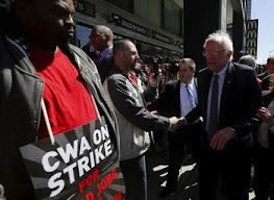Jack Rasmus discusses the strike of 36,000 communication workers that began this week at Verizon Communications and how it reflects the radical destruction by corporations of decent jobs in the US that has been occurring since the 1990s. Jack calculates 52 million of the total 157 million jobs in the US labor force today are some form of ‘contingent’ or so-called ‘alternative work’ arrangements, paying substandard wages and few if any benefits. The Verizon strike represents worker-union efforts to stop corporate conversion of full time regular jobs to ‘contingent,’ outsourced, contract work. Jack discusses a recent Princeton Univ. study that shows temp and independent contract jobs have risen by 9.4 million just since 2005—i.e. more than the total increase in new jobs (9.1m) over the same period. Full time contingent jobs now total 23.6m, according to the Princeton study. Add to that 26 m more in part time contingent employment, plus another 8.2m unemployed and more than 60 million US workers now earn less than full time wages and virtually no benefits. And more if the ‘Uberization’ of work underway is considered. Median earnings for the 50m barely exceed $30k a year. Jack explains this is at the core of the growing working class discontent in the US that is fueling both the Trump and the Sanders candidacies. Jack speculates on the possibility of a 4-way race for the presidency in this year’s elections. The show concludes with a review of the global economy, including the IMF’s recent lowered forecast, China’s recent GDP stats, and Jack revisiting his prior forecast the US economy would again stagnant and approach zero GDP growth for the first quarter 2016 in stats out in a couple of weeks.
Economic Update – Profit-Driven Capitalism – 05.17.15
In this edition of Economic Update, we look at Verizon’s purchase of AOL, why Facebook’s “contribution” to ending inequality falls so short, how latest $$ gift to Yale increases inequality, how UK elections reflect “scapegoat economics, and why deadly Mediterranean migrations reflect capitalism’s globally uneven development. We also respond to listener questions on (1) Americans’ attitudes toward income and wealth inequality by our analysis of recent Gallup Polls and (2) whether student debts can lead to reduced Social Security benefits and what that means. This edition’s major discussions (1) build on “sharing unemployment” to show how we can combine respect for our natural environment with a fair sharing of the leisure that could result, and (2) analyze the significance of recent guilty pleas by major banks for manipulating currency exchange rates for their private profit.


